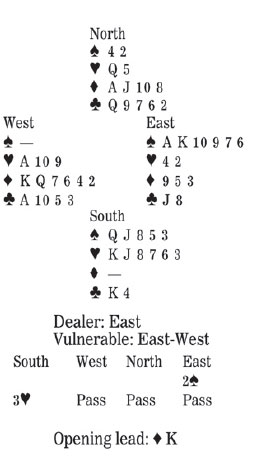Do not rush; take your time
By Phillip Alder ( China Daily ) Updated: 2017-07-08 07:34:46
Tony Benn, who was a cabinet minister in the British Labour government in the 1960s and 70s, said, "It's the same each time with progress. First they ignore you, then they say you're mad, then dangerous, then there's a pause and then you can't find anyone who disagrees with you."
A well-timed pause at the bridge table pays dividends when it permits you to work out the right play. In today's deal, West played far too quickly. South was in three hearts after East had opened with a weak two-bid in spades. West led the diamond king, and declarer discarded his club four on dummy's ace. Then came a club to the king and ace. What should West have done next?
South's three-heart overcall was debatable with so many spades. If South had passed, so would West, because misfits are miserable. Two spades would have gone down at least one. What could South do with all of his spade losers? Not a lot, but he did know that West was void of the suit.
At trick three, West immediately returned a club, hoping his partner would ruff it and shift to spades. However, declarer trumped in his hand, played a heart to the queen, ruffed another club and led the heart king. West won and returned his last heart, but declarer knew what was happening - he played low! Then when West led the diamond queen, declarer threw a spade from his hand. West had to lead a club or a diamond, and South shed his remaining spades on the diamond jack-10 and club queen-nine.
Nicely played, but at trick three West should have shifted to a trump.
|
|
|
|
|
|
|
|

























 Raymond Zhou:
Raymond Zhou: Pauline D Loh:
Pauline D Loh: Hot Pot
Hot Pot Eco China
Eco China China Dream
China Dream China Face
China Face






